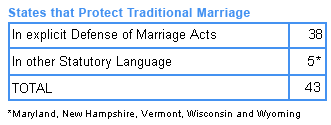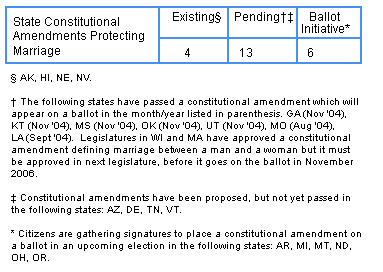Marriage in the 50 States
- THE HERITAGE FOUNDATION
Many states across the nation are moving to either strengthen their existing statutory language that recognizes marriage between a man and a woman or to amend their constitution to preserve the traditional meaning of marriage. The information on this page is intended to reflect the breadth of the movement to defend marriage throughout the United States.
Forty-three states currently have statutory language recognizing traditional marriage. Because states are concerned that their laws may not stand up to legal challenge before activist judges, twenty-two state legislatures are taking action to protect marriage, either through the statutory amendment process, constitutional amendment process, or passage of a non-binding resolution urging Congress to pass a federal constitutional amendment. The national map above is linked to a database of state laws and constitutional provisions that protect marriage. It also tracks the marriage-protecting measures that are being considered in state legislatures. Taking a cue from the passage of the federal Defense of Marriage Act (DOMA) in 1996, many states moved to protect marriage in their state codes in the late 1990s. While all of these states adopted language similar to the federal DOMA, there is some variation. This chart breaks down the federal DOMA language into its componenents and tracks what language was used by which states. States incorporating more components benefit from stronger the statutory language. Examples of states with strong marriage statutes are Alabama, Georgia, Michigan, and Ohio. States with weaker marriage statutes include Delaware, Illinois, Iowa, Maine, South Dakota, and Vermont. Some states had already defined marriage in their state statutes prior to the passage of the federal DOMA. These states are Maryland, New Hampshire, Wisconsin, and Wyoming. Vermont passed a statute in 1999 defining marriage between one man and one woman. It should also be noted that Connecticuts common law recognizes marriage as between a man and a woman. Regardless of whether or not a state has laws or constitutional provisions specifically defining marriage or prohibiting same sex marriage, all states have consanguinity laws, prohibiting individuals from marrying their blood relations. Many states specifically prohibit a male from marrying his female blood relations and females from marrying her male blood relations. Inherent in these laws is the understanding that marriage is between a man and a woman. Click on the map below to read comments from your U.S. Senator about the proposed Federal Marriage Amendment. You will also find information about how they voted on the federal Defense of Marriage Act (DOMA) in 1996.
This database tracks only current state laws and the actions of state legislatures. There are several court cases pending that could potentially redefine marriage by judicial decree. The Alliance Defense Fund is involved in many of these court cases. The Family Research Council and Marriage Law Project track them. |
 This is Meaghen Gonzalez, Editor of CERC. I hope you appreciated this piece. We curate these articles especially for believers like you.
This is Meaghen Gonzalez, Editor of CERC. I hope you appreciated this piece. We curate these articles especially for believers like you.
Please show your appreciation by making a $3 donation. CERC is entirely reader supported.

Acknowledgement
Charissa Kersten. "Marriage in the 50 States." The Heritage Foundation (July, 2004).
This information has been compiled and is being updated by Charissa Kersten and is based on official state websites and information provided by www.stateline.org. It is reprinted here with permission from The Heritage Foundation.
Founded in 1973, The Heritage Foundation is a research and educational institute a think tank whose mission is to formulate and promote conservative public policies based on the principles of free enterprise, limited government, individual freedom, traditional American values, and a strong national defense.
The Author
Charissa Kersten is program coordinator of the Heritage Foundation's Center for American Studies where she is a research assistant and events planner/coordinator.
Copyright © 1995 The Heritage Foundation





